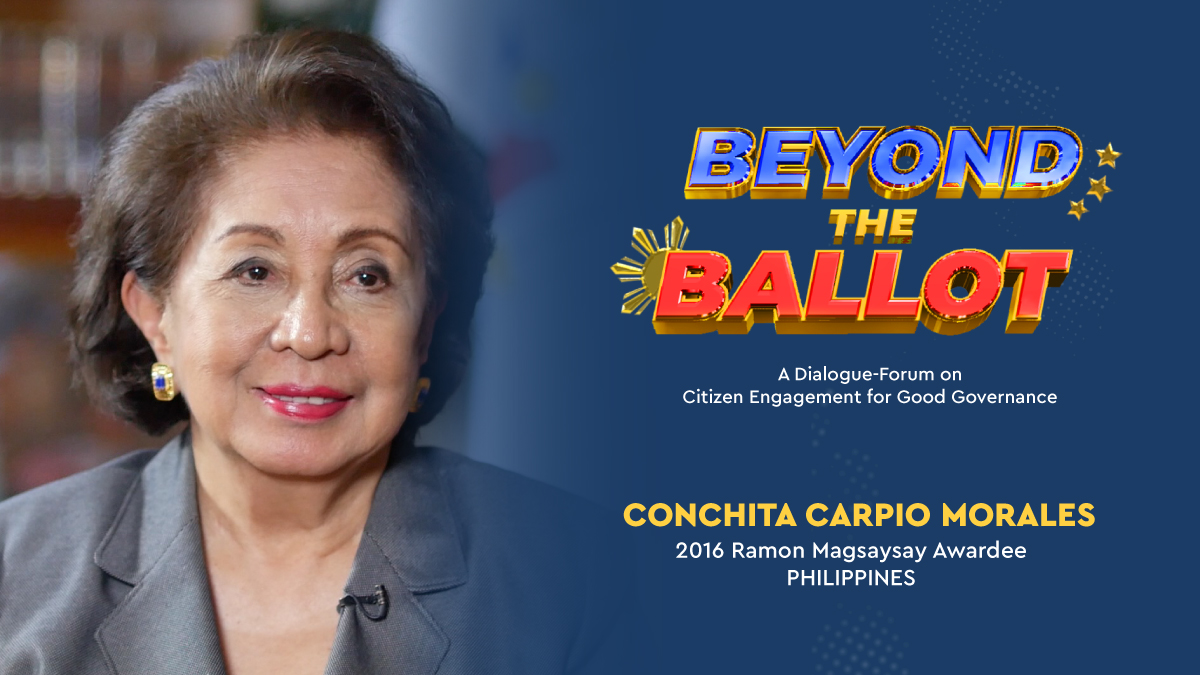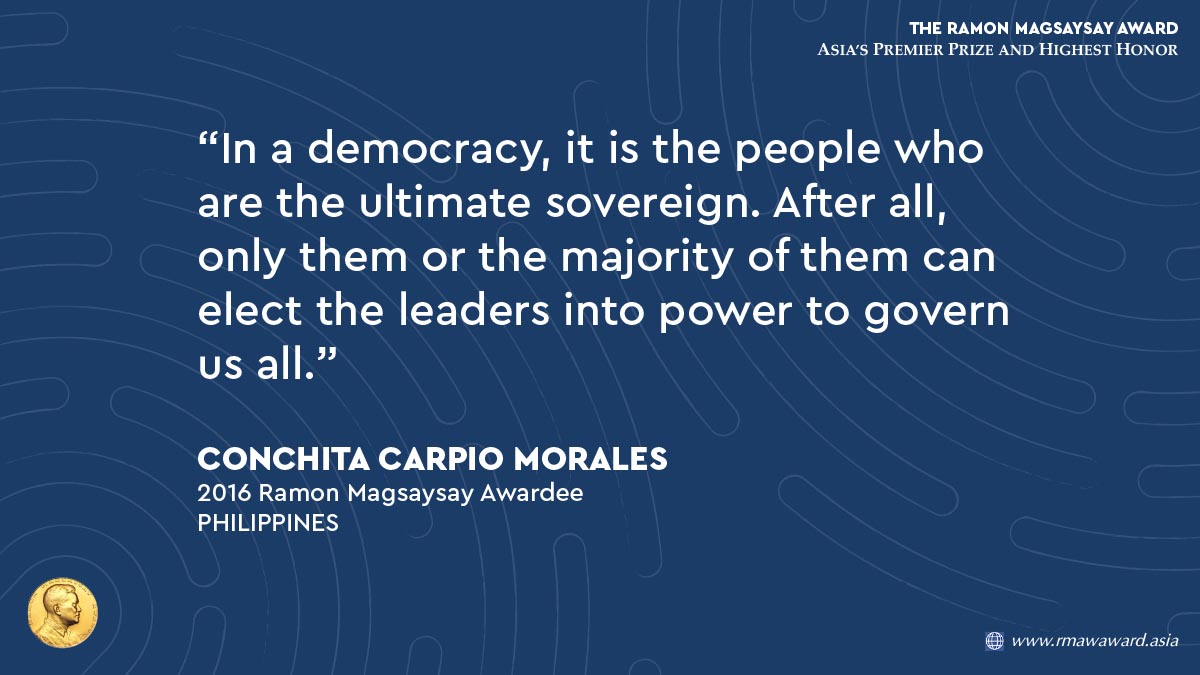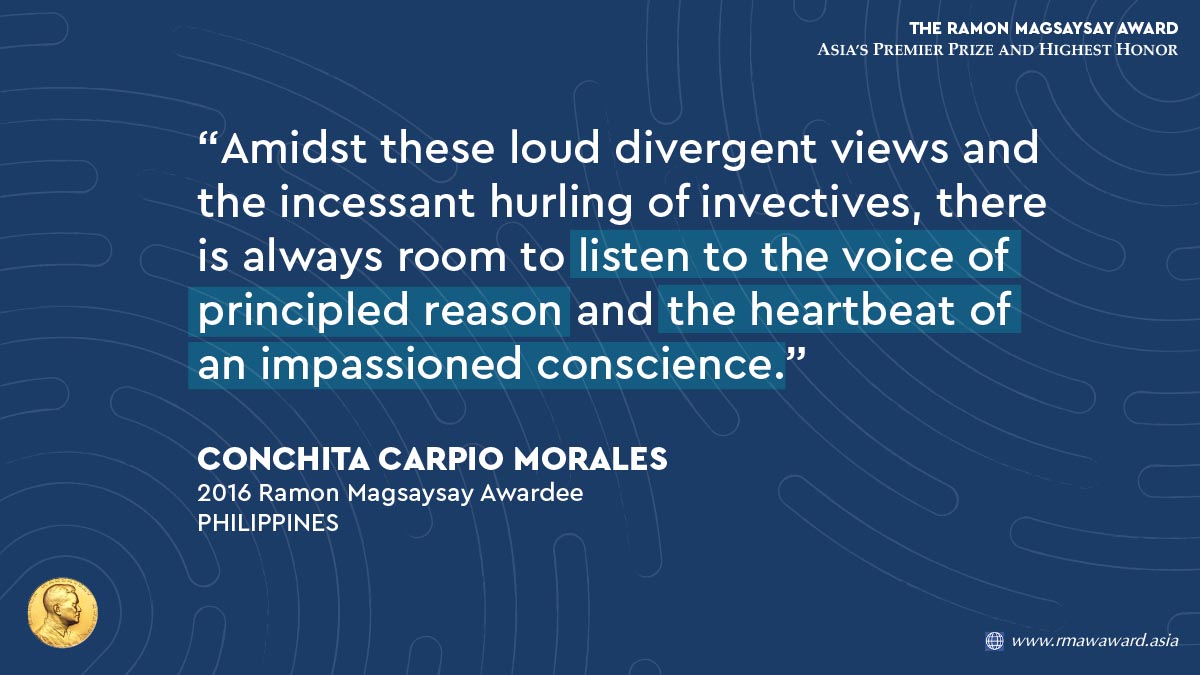Join us in our 65th Anniversary
GET INVOLVED

Thank you for inviting me to this Dialogue-Forum on Citizen Engagement for Good Governance initiated by the Ramon Magsaysay Transformative Leadership Institute, in partnership with Young Public Servants.
I was informed that this Dialogue-Forum seeks to foster citizen engagement among the country’s youth and first-time voters to promote good governance and protect and uphold key democratic processes in a post-election context. The discussion is also expected to contribute to the ongoing global discourse on critical thinking in selecting local and national leaders, and citizen engagement in the digital age.
Our young citizens may also benefit from the insights and exchanges, for them to be equipped with the tools, resources, opportunities, or with the right information to deeply engage in democratic processes.
To understand the importance of citizen engagement, especially in the context of our own relatively young democracy, is to identify and acknowledge the manifestations and root causes of our democratic inadequacy and opportunity to address them.
The rule of law is the bedrock of democracy. The law serves as the proverbial lighthouse that guides our nation as it charts the course of history. It mirrors the matrix of values or mores of a given society. As former US Supreme Court Chief Justice Earl Warren stated, “[i]n civilized life, law floats in a sea of ethics.” What keeps the law afloat is the supporting buoyancy of the underlying ethical values. The legitimacy of any law—or jurisprudence for that matter—would either sink or set sail depending on the strength of the “sea of ethics” on which it relies for buoyancy and resilience. If I may add, I am convinced that the vibrancy of democracy reinforces the legitimacy of law and vice-versa. And the quality of democratic vibrancy is intrinsically linked to the quality of citizen engagement. Please allow me to discuss this further.

Democracy provides the setting for everyone to exercise their inviolable rights. And democracy becomes more vibrant as more citizens can freely exercise their rights. Every citizen must exercise their basic rights to protect and defend democracy. In our case, we must encourage all our citizens, especially our youth, to exercise our rights to strengthen and sustain our young democracy. Yes, ours is still a struggling or striving democracy, as we had elected leaders to whom our basic democratic and human rights may have become incomprehensible and distorted, or mere tokens to their tyrannical ambitions. But as democracy enables Citizen Engagement, and as technology can enable Citizens Engagement, our youth is the key to make our democracy more vibrant.
It is true that in a democracy, it is the people who are the ultimate sovereign. After all, only them or the majority of them can elect the leaders into power to govern us all. By now, we have to realize that there is logic, no matter how perverse it may seem, why our people continue to elect the “wrong” leaders. Patronage politics and corruption cannot exist without the other. For those who may be outside this patronage politics, many remain apathetic to human rights violations and corruption—untouched, as they live comfortably anyway, until the next tragedy hits home, or until a loved one becomes the next victim.
The linkage between human rights and corruption should not be missed. The late UN Secretary-General Kofi Annan explains:
“Corruption is an insidious plague that has a wide range of corrosive effects on societies. It undermines democracy and the rule of law, leads to violations of human rights… Corruption hurts the poor disproportionately—by diverting funds intended for development, undermining a government’s ability to provide basic services, feeding inequality and injustice, and discouraging foreign aid and investment.”
A not-so-recent study also concluded that when corruption thrives, human rights are denied, and correlatively, when denial of human rights continues, corruption persists.
The doctrine of checks and balances is also under threat from those who cannot bear even fair criticisms. John Adams, one of the leading advocates of this doctrine and one of the founding fathers who served as the second president of the United States of America (1797-1801) said:
“A legislative, an executive and a judicial power comprehend the whole of what is meant and understood by government. It is by balancing each of these powers against the other two, that the efforts in human nature toward tyranny can alone be checked and restrained, and any degree of freedom preserved in the constitution… (underscoring provided)”
Having served the executive branch and the judiciary, I am inclined to conclude that the balance has tilted against the judicial branch. While the 1987 Philippine Constitution enshrined judicial activism through, among others, judicial review of actions and decisions of the two other branches, much still has to be done to promote the independence of the courts.
The absence of checks and balances mechanism plus a timid press present a clear and present danger to democracy. One just has to rule by intimidation and disinformation to impose tyranny.

And with one inconvenient truth. The upcoming election on May 9 as we may unfortunately expect, may be again, a manifestation of our people’s political fatalism. I am reminded that among the frontrunners are politicians whom I would rather see jailed than elected. How could we miss the logic why majority of our people would still elect them? Apart from the ridiculous jaded promises, the people are just as perplexed as any political pundits, why the unscrupulous and the corrupt remain unpunished, scot-free, and worse, a qualified political candidate? We could not really fault if majority of our people could think that the only way to extract real benefits from exercising their power to vote is to be part of the gravy train of patronage politics. We cannot really blame the majority, but we can radically engage them to minimize, if not end, the folly or anathema of having thieves or corrupt politicians as qualified candidates. Arguably, the truth should be scandalously weaponized to the full extent of shaming these candidates and their enablers to prevent them from running, if the long arm of the law is not yet fully bent to catch them!
Being young and technology–savvy, our youth must realize that latest in technology, especially the social media, have the capability to strengthen our democracy. The ubiquitous Facebook, for example, has provided everyone (or shall I say anyone), even those below 13 years old (which is the Facebook requirement to open an account), an easy platform to let their voices be heard.
Media literacy is our first line of defense. But let it be made clear that media literacy should not be used as an excuse to curtail freedom of expression.
In October 2018, Business for Social Responsibility (BSR) released its Facebook-commissioned study, Human Rights Impact Assessment: Facebook in Myanmar. The report noted that Facebook has been “described as having a powerful democratizing effect in Myanmar by exposing millions of people to concepts like democracy and human rights, increasing accountability for lawmakers and enforcers, and providing a communications channel for political representatives and their constituents. It also provides a learning platform for human rights activists, which improves civic participation and empowers civil society.”
But as we are all aware, the use of Facebook also has many downsides. No less than Ms. Yanghee Lee, the UN Special Rapporteur on Human Rights in Myanmar, was reported to have said, "I am afraid that Facebook has now turned into a beast, and not what it originally intended.”
What prompted the UN Special Rapporteur to give this opinion may be the many documented reports on the use of Facebook to spread rumors about people and events which have been associated with communal violence and mob justice and the proliferation of fake accounts and news pages by organized groups to spread hate speech, fake news, and misinformation for political gain.
Many of these observations may very well apply to our country which has prompted many sectors to push back to reclaim sanity and order in our virtual public space and for Facebook to be more serious in enforcing its Community Standards.
But what attracted me most in the Human Rights Impact Assessment 2018 Report is the observation that the use of Facebook and smartphones proliferated even before the public has learned some form of digital literacy. It noted that “the majority of the population lacks the digital literacy to effectively navigate the complex world of information-sharing online.”
Facebook, Instagram, Twitter, Messenger, Viber, among others, all add to the discordant voices around us. Amidst these loud divergent views (or shall I say noise) and the incessant hurling of invectives, there is always room to listen to the voice of principled reason and the heartbeat of an impassioned conscience.
I am fully supportive of the promotion of media literacy to make our people more discerning and responsible not only in terms of media consumption but also sharing of media content. Media literacy is our first line of defense and it has both immediate and long-term impact. But let it be made clear that media literacy should not be used as an excuse to curtail freedom of expression.
In closing and as a prospective goal for the promotion of media literacy, I appeal to our Youth and First-time Voters being the significant part of the Ultimate Sovereign, must also be the most responsible, if not the most vigilant, to sustain our democracy. Our Youth are also in the best position to protect and uphold key democratic processes in a post-election context, as they can continue to account, monitor and publicly shame those elected to power and the entire government of their shenanigans through usage and exchanges in latest technology platform/s and social media instruments,
Maraming salamat at magandang hapon po sa ating lahat.
2016 Ramon Magsaysay Awardee CONCHITA CARPIO MORALES (Philippines) delivered this speech on May 4, 2022 during a Ramon Magsaysay Award Foundation webinar titled "Beyond the Ballot". A former Supreme Court Justice and Ombudsman of the Philippines, MORALES received the Ramon Magsaysay Award, Asia's premier prize and highest honor, for "her moral courage and commitment to justice in taking head-on one of the most intractable problems in the Philippines; promoting by her example of incorruptibility, diligence, vision and leadership, the highest ethical standards in public service."
References: